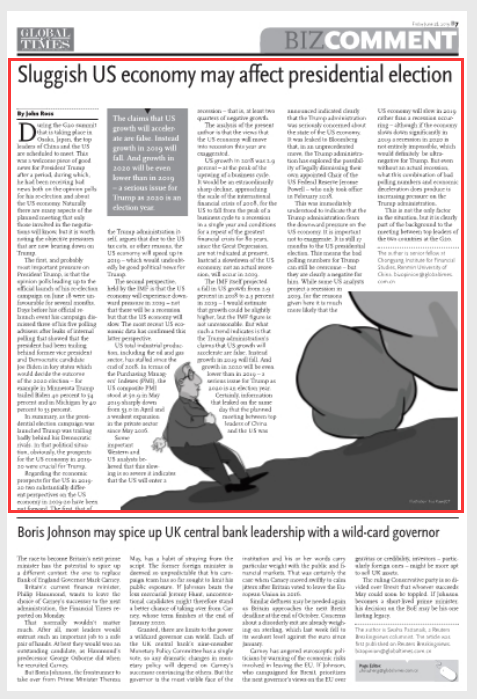Major Power Relations
Your Present Location: PROGRAMS> Major Power RelationsJohn Ross: Sluggish US economy may affect presidential election
By John Ross Source: Global Times Published: 2019-6-27
During the G20 summit that is taking place in Osaka, Japan, the top leaders of China and the US are scheduled to meet. This was a welcome piece of good news for President Trump after a period, during which, he had been receiving bad news both on the opinion polls for his re-election and about the US economy. Naturally there are many aspects of the planned meeting that only those involved in the negotiations will know, but it is worth noting the objective pressures that are now bearing down on Trump.

The first, and probably most important pressure on President Trump, is that the opinion polls leading up to the official launch of his re-election campaign on June 18 were unfavourable for several months. Days before his official re-launch event his campaign dismissed three of his five polling advisers after leaks of internal polling that showed that the president had been trailing behind former vice president and Democratic candidate Joe Biden in key states which would decide the outcome of the 2020 election - for example in Minnesota Trump trailed Biden 40 percent to 54 percent and in Michigan by 40 percent to 53 percent.
In summary, as the presidential election campaign was launched Trump was trailing badly behind his Democratic rivals. In that political situation, obviously, the prospects for the US economy in 2019-20 were crucial for Trump.
Regarding the economic prospects for the US in 2019-20 two substantially different perspectives on the US economy in 2019-20 have been put forward. The first, that of the Trump administration itself, argues that due to the US tax cuts, or other reasons, the US economy will speed up in 2019 - which would undoubtedly be good political news for Trump.
The second perspective, held by the IMF is that the US economy will experience downward pressure in 2019 - not that there will be a recession but that the US economy will slow. The most recent US economic data has confirmed this latter perspective.
US total industrial production, including the oil and gas sector, has stalled since the end of 2018. In terms of the Purchasing Managers' Indexes (PMI), the US composite PMI stood at 50.9 in May 2019 sharply down from 53.0 in April and a weakest expansion in the private sector since May 2016.
Some important Western and US analysts believed that this slowing is so severe it indicates that the US will enter a recession - that is, at least two quarters of negative growth.
The analysis of the present author is that the views that the US economy will move into recession this year are exaggerated.
US growth in 2018 was 2.9 percent - at the peak of the upswing of a business cycle. It would be an extraordinarily sharp decline, approaching the scale of the international financial crisis of 2008, for the US to fall from the peak of a business cycle to a recession in a single year and conditions for a repeat of the greatest financial crisis for 80 years, since the Great Depression, are not indicated at present. Instead a slowdown of the US economy, not an actual recession, will occur in 2019.
The IMF itself projected a fall in US growth from 2.9 percent in 2018 to 2.3 percent in 2019 - I would estimate that growth could be slightly higher, but the IMF figure is not unreasonable. But what such a trend indicates is that the Trump administration's claims that US growth will accelerate are false. Instead growth in 2019 will fall. And growth in 2020 will be even lower than in 2019 - a serious issue for Trump as 2020 is an election year.
Certainly, information that leaked on the same day that the planned meeting between top leaders of China and the US was announced indicated clearly that the Trump administration was seriously concerned about the state of the US economy. It was leaked to Bloomberg that, in an unprecedented move, the Trump administration has explored the possibility of legally dismissing their own appointed Chair of the US Federal Reserve Jerome Powell - who only took office in February 2018.
This was immediately understood to indicate that the Trump administration fears the downward pressure on the US economy. It is important not to exaggerate. It is still 17 months to the US presidential election. This means the bad polling numbers for Trump can still be overcome - but they are clearly a negative for him. While some US analysts project a recession in 2019, for the reasons given here it is much more likely that the US economy will slow in 2019 rather than a recession occurring - although if the economy slows down significantly in 2019 a recession in 2020 is not entirely impossible, which would definitely be ultra-negative for Trump. But even without an actual recession, what this combination of bad polling numbers and economic deceleration does produce is increasing pressure on the Trump administration.
This is not the only factor in the situation, but it is clearly part of the background to the meeting between top leaders of the two countries at the G20.
The author is senior fellow at Chongyang Institute for Financial Studies, Renmin University of China.























































































 京公网安备 11010802037854号
京公网安备 11010802037854号





